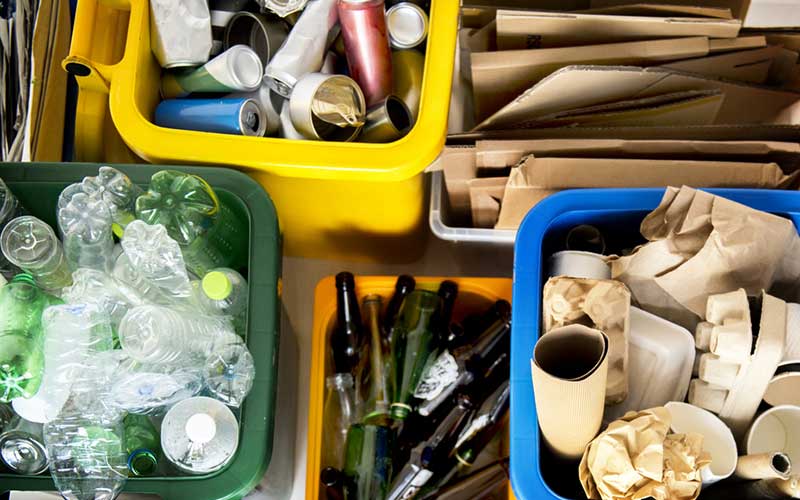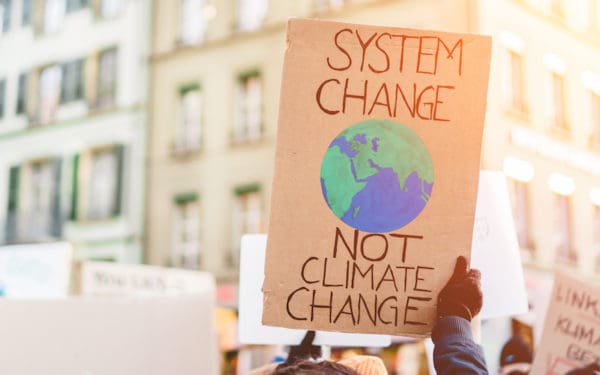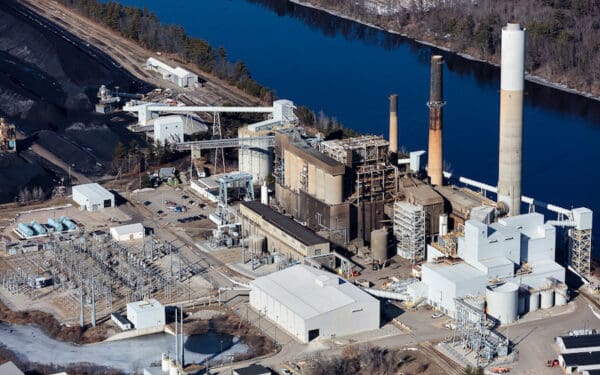
As we struggle under the weight of our trash crisis, we have no time to waste. New England needs zero waste laws to fight back against the flood of packaging fueling this crisis. Photo via Shutterstock
Rhode Island has a waste problem. Our only landfill is reaching the end of its life expectancy. Companies that burn waste knock at lawmakers’ doors pitching their toxic and climate-damaging technologies as false solutions. And recycling costs soar for towns and cities across the Ocean State. All the while, big corporations push more and more packaging waste into our lives.
Although Rhode Island has many unique qualities, our trash crisis is not one of them. Yet, we do face a unique disadvantage when it comes to packaging waste. Unlike our neighbors in Connecticut and Massachusetts, we don’t have a bottle return system. In fact, we don’t have any laws that hold packaging manufacturers accountable for all the trash they create.
As we struggle under the weight of our trash crisis, we have no time to waste (pun intended). Rhode Island needs high-performing zero waste laws, like bottle return programs and producer responsibility for packaging, as soon as possible. So does every other state in New England. Together, these zero waste laws ensure we can fight back against the flood of packaging fueling this crisis.
Zero Waste Laws Hold Polluters Accountable
Producer responsibility programs make packaging manufacturers responsible for the entire lifecycle of their products. This fundamental idea underlies all forms of producer responsibility. However, the approach differs depending on the type of program.
Take Bottle bills – one of the oldest and most widespread ways to hold producers accountable. These programs place a refundable deposit of 5 or 10 cents on beverage containers, which you get back when you return an empty bottle or can. They also require beverage distributors to pay a handling fee to fund container storage, collection, and recycling. An early form of producer responsibility, Bottle Bills require beverage companies to pay to manage the lifecycle of their products.
Then you have “buy back” programs – typically used for difficult-to-manage products like mattresses, batteries, mercury thermostats, among others. The first of these programs – for electronics and paint – were implemented more than a decade ago. These programs fall under the producer responsibility umbrella because they require producers to take back and manage their products.
That brings us to producer responsibility for packaging. This is the next step in holding producers accountable for the flood of single-use packaging waste they pump out. In 2021, Maine passed the first producer responsibility for packaging law in the country. Oregon followed soon after. Now, at least a dozen more states are considering this legislation, putting the country on a path to finally take action against single-use packaging pollution.
Producer Responsibility for Packaging: A Big Solution to a Complex Problem
In Rhode Island – and across the country – packaging waste makes up about 20% of all the trash we bury or burn. Much of that packaging should be recyclable. But in a single-stream system where we throw all packaging items into one bin, recycling gets complicated. That’s because recycling facilities struggle to separate out different materials. That means most packaging waste doesn’t get recycled at all.
Sadly, plastic represents an increasing share of this waste. In fact, we’ve gone from generating 120,000 tons of plastic packaging waste in 1960 to more than 14.5 million tons in 2018. Unsurprisingly, most of this packaging does not get recycled. What’s more, towns and cities bear much of the financial burden of dealing with this waste – and we continue to see those costs rise. And despite what industry giants want us to believe, we will not solve this problem with plastic-burning technologies.
Instead, we need to roll up our collective sleeves and create programs that:
- Make producers pay for their waste;
- Use that money to compensate towns and cities for their waste and recycling costs and to fund systems that make it easier to reuse and recycle packaging;
- Require producers to reduce their single-use packaging and pivot to reusable packaging; and
- Eliminate toxics – including heavy metals, forever chemicals, and carcinogens – from packaging.
Modern producer responsibility for packaging laws can do all of this at once. Because packaging waste is a complex problem, it calls for a comprehensive and far-reaching solution.
Bottle Bills Have a Proven Track Record
If modern producer responsibility for packaging is such a great approach, then why do we also need bottle return programs? Because bottle return programs can solve the beverage container problem.
Modern bottle return programs have a 10-cent deposit and a handling fee high enough to fund a robust redemption network. As a result, they can collect more than 90% of beverage containers for recycling. That’s far higher than the percentage of bottles and cans recycled through curbside collection. Why? Because bottle return programs separate out different kinds of beverage containers. Keeping bottles separate from other materials makes it easier – and cheaper – to clean and recycle them.
Unlike most of the packaging that ends up in our recycling bins, we use beverage containers on the go – making them the most common type of packaging found at litter cleanups. But we can reduce that litter with bottle bills.
Together, Producer Responsibility and Modern Bottle Bills Move Us Toward Zero Waste
Here in Rhode Island, we’re burying about 17,000 tons of beverage containers in our only landfill every year. And the glass containers that we put in our recycling bins? Those end up in the landfill, too. All those wasted containers call for a simple, proven solution – a bottle bill.
We’re also burying about 87,000 tons of other packaging. That waste calls for a more complex solution – extended producer responsibility for packaging.
There is no one-size-fits-all approach to our waste crisis. Getting to zero waste means using all the tools in the toolbox, including zero waste laws. Bottle bills and producer responsibility for packaging happen to be two of our best tools, so let’s use them both.




